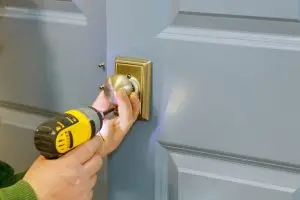The shift toward remote work has changed the way we think about home and office security. In Calgary, more people are turning spare rooms, basements, and garages into full-time workspaces. While this flexibility brings comfort and independence, it also introduces new security challenges. As locksmiths, we have seen firsthand how a small adjustment in home security can make a big difference for those working from home.
Understanding Security Risks for Remote Workers
Working from home often means keeping valuable equipment on-site. Laptops, cameras, hard drives, and confidential documents are now stored in residential spaces rather than secured office environments. This creates new vulnerabilities that many households are not prepared for.
A simple lock on the front door is no longer enough. We need to think about layered security: entry points, internal locks, mail and package safety, and even smart access control. Understanding how each of these elements contributes to overall safety helps remote workers protect their work environment and peace of mind.
Balancing Comfort and Security at Home
One of the biggest advantages of working remotely is comfort. We wear what we want, eat at our own schedule, and create spaces that reflect our personality. But comfort should not come at the expense of safety.
Good security does not need to feel restrictive. A solid deadbolt on the main door, secure window locks, and a simple routine of checking all entry points at the end of the day already reduce risks significantly. Many people also overlook interior locks. If your workspace contains sensitive material, an additional keyed lock on that door can separate professional and personal areas effectively.
Why Home Offices Need Commercial-Grade Security
Most residential locks are designed for occasional use and privacy, not for daily protection of work assets. Businesses, on the other hand, rely on more durable and complex locking systems that can handle frequent use and key management. Remote professionals who handle sensitive data or expensive tools may benefit from integrating elements of commercial-grade systems into their homes.
Installing hardware designed for business environments adds longevity and reliability. For instance, a sturdy lever handle with an ANSI Grade 1 deadbolt resists forced entry better than standard residential locks. Setting up a master key system or restricted keyway can also prevent unauthorized duplication, something important for homes where multiple family members have access.
Those interested in exploring stronger security options can learn more by visiting the page for commercial locksmith in Calgary, which covers solutions that adapt commercial security standards for remote work environments.
Managing Access for Shared Spaces
Many remote workers share their home or workspace with others. Partners, children, tenants, or even cleaners and delivery personnel often come and go throughout the day. Managing who can enter which area becomes crucial.
Smart locks and programmable keypads can help maintain boundaries. These systems allow you to set different codes or permissions for each person, and they record access history. When used correctly, they can help identify irregularities or limit access to sensitive areas without the need for physical keys.
However, digital systems come with their own risks. Always choose reputable brands and change passwords regularly. Also, remember that a smart lock is still a physical lock—it must be installed properly, and the door must close securely every time.
The Importance of Mail and Package Security
Remote work has increased online shopping and home deliveries. Packages left on porches are easy targets for theft, and missing deliveries can cause both financial loss and frustration.
Installing a secure drop box, locking mailbox, or small parcel safe can solve this issue. Another option is to create a routine with delivery services, instructing them to place packages inside a fenced area or through a locked vestibule. Even a small adjustment to delivery habits reduces exposure.
We also recommend avoiding leaving sensitive documents or client materials in outdoor mailboxes overnight. If possible, store all paperwork in a locked cabinet or drawer indoors.
Internal Locking and Confidential Work
Professionals working in finance, law, design, or health fields often handle private information. In such cases, a simple door lock might not provide enough privacy. Installing a secure filing cabinet or an internal lock on your office door ensures that sensitive information remains confidential, especially when family or visitors are present.
This is not just about preventing theft. It also helps maintain psychological separation between work and personal life. Knowing that your workspace closes securely at the end of the day creates a clear boundary, something remote workers often struggle to maintain.
Smart Technology and Remote Work Integration
Many homes now rely on smart devices: thermostats, lights, and cameras that operate through a smartphone. Adding smart locks to this ecosystem can enhance control and convenience. You can monitor entries, receive alerts, and even grant temporary access to service providers while you are away.
Still, technology should never replace common sense. Regularly updating firmware, using secure Wi-Fi networks, and creating strong passwords are essential. We also advise installing backup mechanical keys or emergency overrides to prevent lockouts caused by connectivity failures.
Re-Keying After Staff Changes or Room Rentals
Some remote workers rent out part of their property or hire temporary help for childcare, cleaning, or maintenance. Over time, keys can circulate widely without clear tracking. When circumstances change—such as ending a rental or service agreement—it’s wise to re-key the locks.
Re-keying allows you to maintain the same hardware while changing the internal pin configuration. It’s faster and more affordable than full replacement, and it ensures that old keys no longer work. This small step provides renewed confidence in the security of your space.
More information about re-keying and similar solutions can be found through a locksmith in Calgary, where details on securing both homes and professional spaces are explained.
Protecting Equipment and Digital Assets
Locksmiths not only handle doors but can also help with physical data protection. Fire-resistant safes or lockable storage cabinets are excellent options for securing laptops, drives, and other valuable items.
Many remote professionals also forget that physical theft can compromise digital security. Losing a laptop often means losing client data and stored passwords. Keeping devices locked away when not in use, even during short errands, can prevent such losses.
Additionally, having a small safe bolted to the floor or inside a wall is useful for storing backup drives, contracts, or emergency funds.
When to Seek Professional Help
Homeowners often underestimate how much a locksmith can do beyond fixing locks or responding to emergencies. Security is about strategy, not just equipment. A professional locksmith can assess your layout, check weak points like sliding doors or basement windows, and recommend improvements that suit your budget.
If you ever feel unsure about your current setup or want to upgrade to meet new work-from-home needs, you can contact us to discuss available options. A short consultation can reveal vulnerabilities you might not notice on your own.
Preparing for Emergencies
Remote work often means being at home most of the day, but emergencies still happen. Losing a key, locking yourself out, or experiencing a malfunction can disrupt both personal life and work schedules.
To prepare, keep a spare key with a trusted person rather than under a mat or in a visible hiding spot. Consider storing locksmith contact information in your phone under “Emergency Services.” Knowing where to turn during an unexpected situation prevents panic and ensures a fast response.
Integrating Security into Daily Routine
Effective security depends on consistency. Locking doors during short breaks, closing windows when leaving a room, and storing valuables properly form habits that protect you naturally. The goal is to make security automatic, not an afterthought.
Remote workers can create a quick checklist to follow each day before finishing work. It might include locking doors, checking windows, and storing electronics in a safe place. Over time, this small habit makes the home feel more like a secure office again.
FAQ
What is the best type of lock for a home office?
For most home offices, a Grade 1 deadbolt provides a solid balance between durability and affordability. Adding a keyed lever or knob for interior privacy can enhance protection further.
Should I use smart locks if I work from home?
Smart locks are convenient and allow flexible access management. They are safe when installed correctly and combined with strong passwords and regular software updates.
How often should locks be re-keyed?
We recommend re-keying every few years or after any major change in household access, such as moving in new tenants, hiring help, or losing a key.
Is it worth installing a safe for remote work?
Yes, a small fire-resistant safe is a smart investment for securing documents, hard drives, and other valuables. It protects against both theft and accidental damage.
Can locksmiths help with security audits?
Absolutely. A locksmith can inspect your home layout, assess entry points, and recommend upgrades tailored to your specific remote work environment.





